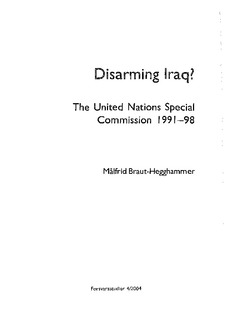| dc.contributor.author | Braut-Hegghammer, Målfrid | |
| dc.date.accessioned | 2011-10-21T09:22:12Z | |
| dc.date.available | 2011-10-21T09:22:12Z | |
| dc.date.issued | 2004 | |
| dc.identifier.issn | 0333-3981 | |
| dc.identifier.uri | http://hdl.handle.net/11250/99405 | |
| dc.description | After the Gulf War in 1991, the United Nations Security Council’s ‘ceasefire resolution’ obliged Iraq to destroy all weapons of mass destruction (WMD) and associated infrastructures. The United Nations Special Commission (UNSCOM) was established to oversee Iraq’s disarmament. However Iraq’s partial cooperation led to the emergence of several unresolved disarmament questions concerning Iraq’s intentions in the area of WMD. After operation Desert Fox in 1998, the disarmament regime fell apart.
UNSCOM is now considered a major success of the United Nations. The case of UNSCOM and Iraq uniquely illustrates challenges and difficulties facing an effort to enforce (WMD) disarmament on a sovereign country. | en_US |
| dc.language.iso | eng | en_US |
| dc.publisher | Institutt for Forsvarsstudier | en_US |
| dc.relation.ispartofseries | Forsvarsstudier;4 | |
| dc.subject | USA | en_US |
| dc.subject | Irak | en_US |
| dc.subject | nedrusting | en_US |
| dc.subject | UNSCOM | en_US |
| dc.title | Disarming Iraq?: the United Nations Special Commission 1991-98 | en_US |
| dc.type | Others | en_US |
| dc.source.pagenumber | 149 s. | en_US |
